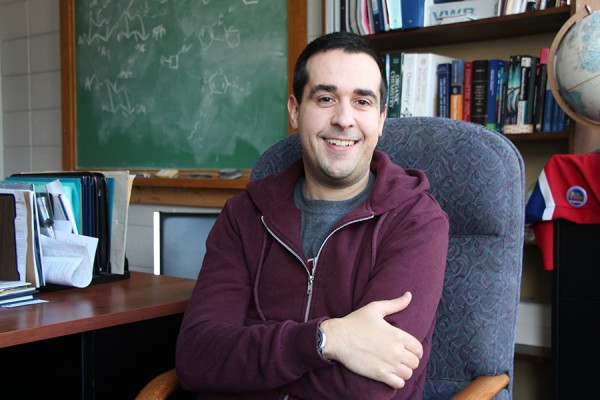 Simon Rondeau-Gagné is in the early stages of developing implantable or injectable “nanoantennas” to deliver electric charges to brain tumours.
Simon Rondeau-Gagné is in the early stages of developing implantable or injectable “nanoantennas” to deliver electric charges to brain tumours.
In what sounds like a medical treatment available only to characters in a sci-fi movie, a pair of UWindsor cancer researchers are working on a nanoparticle that could one day be injected into the bloodstream to attack brain tumours.
Polymer chemist Simon Rondeau-Gagné and molecular biologist Lisa Porter have teamed up with London neurosurgeon Matthew Hebb to research how to better deliver electric fields to shrink glioblastoma tumours. Current treatments use electrodes attached to a patient’s head, but the UWindsor-led team of researchers believe a better strategy involves the use of nanotechnology.
“We are in the early stages, but we believe the proposed approach will have significant impacts for patients affected by brain cancer by giving them a new hope for treatment and a much better quality of life,” said Dr. Rondeau-Gagné.
He is developing nanomaterials made of conjugated polymer that will serve as microscopic antennas to deliver electric fields directly to tumors without affecting normal brain tissue. He said these synthetic “nanoantennas” can be implanted or injected into patients.
“It’s a unique strategy,” Rondeau Gagné said. “We will create local hotspots in the brain.”
Glioblastoma is a very aggressive cancer that evades current treatment strategies because of its tentacle-like growth. Also known as glioblastoma multiforme, it’s the type of cancer that claimed the lives of The Tragically Hip frontman Gord Downie and UWindsor professors Mary Johnston and Alan Scoboria.
Dr. Hebb is a pioneer in the use of intratumoral modulation therapy, or IMT. His studies have shown that the glioblastoma tumours react to electric fields.
The new strategy is called molecular intratumoral therapy or MIMT and will use conductive polymers to deliver the electric charge. The patient will be placed in an electric field and the nanoparticles containing conductive materials will pick up the charge and deliver it to the tumour sites.
Dr. Porter will assess the extent and rate to which the new therapy targets tumours.
Rondeau-Gagné has received $39,000 in research funding through Seeds4Hope, the Windsor Cancer Centre Foundation’s annual grant program. The research project is one of three funded this year at the University of Windsor.
In his grant application, Rondeau-Gagné pointed out that, compared to the rest of Ontario, the morbidity rate from brain cancer and other disorders of the central nervous system was 31 per cent higher for males and 21 per cent higher for females in Windsor and Essex County.
“This research constitutes the first seeds of a new, innovative, meaningful and locally-developed solution for brain cancer in our community.”
─Sarah Sacheli
